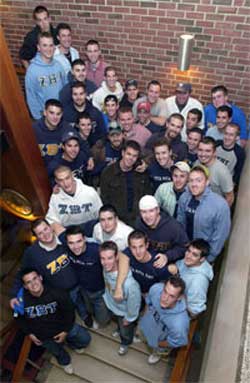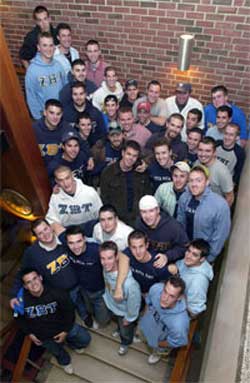 “The traditional core values of the fraternity and sorority systems are values of which we can all be proud. During the past several decades those values were often corrupted by a reckless culture where alcohol abuse was all too common. Sometimes a group has to hit bottom before that group can start to rebuild. I think that has happened to the fraternities at URI, and I’m optimistic right now that we are firmly on the road to recovery.” President URI Robert L. Carothers
“The traditional core values of the fraternity and sorority systems are values of which we can all be proud. During the past several decades those values were often corrupted by a reckless culture where alcohol abuse was all too common. Sometimes a group has to hit bottom before that group can start to rebuild. I think that has happened to the fraternities at URI, and I’m optimistic right now that we are firmly on the road to recovery.” President URI Robert L. Carothers
KINGSTON, R.I. – March, 20, 2006–Once Greek Life at the University of Rhode Island was like a smooth train ride. On their way to their graduation destination students in the University’s social fraternities and sororities were committed to leadership, scholarship, and service.
The sorority compartments continued on a consistent journey, but during the ‘80s, the fraternity cars went off the track. That’s when the legal drinking age in Rhode Island was changed from 18 to 21. At the same time, social events with alcohol were banned in URI’s residence halls. As a result, membership in fraternities and sororities, which had been declining, began to soar.
“Fraternities became the bars of Kingston,” explains Tom Dougan, vice president of Student Affairs, “and their buildings began a steady deterioration.”
The ‘90s became the age of Greek liability. Nationally, lawsuits surged against chapters and members for alcohol-related accidents and injuries, forcing many national fraternities to band together to pay the skyrocketing insurance premiums. Greek membership sagged.
Scott Tsagarakis, director of the Fraternity Managers Association at URI for 25 years, was kept busy purchasing glass for broken windows and sheet rock to cover holes in the walls. “At one time, we were incapable of keeping up,” he admits. “As fast as we could fix things, we were re-fixing them. Safety was our main concern. We were constantly replacing “Exit” signs and refilling or replacing fire extinguishers.
“Don’t get me wrong, students are always going to be students. But the phone doesn’t ring as often with calls for repairs now. I mean I’m not quite the Maytag repair man, but the phone sits silent for longer periods of time.”
So what’s happened? Why is Greek membership, which floundered in the ‘90s, growing in leaps and bounds, despite the 1995 decision to put the cork in the bottle on campus, prohibiting alcohol in the fraternities? Why are two of the eight fraternities, Sigma Chi and Phi Mu Delta, which were closed after repeated violations during the late ‘80s and 90s, primarily for alcohol abuse, petitioning to return to campus? Why is a new fraternity, Kappa Sigma, trying to establish a chapter? And why, after 25 years, has a new fraternity house been constructed on campus?
One answer is that a single sound from administrators, staff, students, faculty, and alumni has resulted in a symphonic cultural change, with an underlying melody of student leadership and responsibility. The changes include:
•Two National Institute on Alcohol Abuse and Alcoholism grants, totaling $4.3-million, awarded to URI in 2003 and 2004 to support the progressive change tempo underway. The grants headed by Fran Cohen, dean of students and Mark Wood, associate professor of psychology; are providing research-based programming which could serve as a model for universities nationwide.
• All fraternities became substance free in 2005. (Sorority chapters have always prohibited alcohol use.)
• Greek houses now have live-in advisors, either a graduate student or house parent who assists members in self-government and policy enforcement issues.
• A new freshmen orientation component covers Greek life.
• The Greek system modeled responsible behavior by adopting a moratorium on beginning-of-the year parties, which resulted in a decline of transports to local hospitals from 18 to 0 in 2001.
• In an undergraduate-led initiative, all new Greek members are now required to complete a 101 course that addresses such subjects as hazing, alcohol, community service, scholarship, and leadership.
• Leadership training, which was and still is a fundamental part of Greek Life, is ongoing, including retreats at the W. Alton Jones Campus.
• The first Greek Affairs director, Steve Simo whose background is in leadership training, was appointed in 2005. Simo oversees 1,100 active Greek members on campus, or about 10 percent of URI’s undergraduate population.
In addition to alcohol, hazing is another skeleton in the national fraternity closet. At URI, there have been two reported hazing incidents in the last five years. “Reported is the operative word,” says Vice President Dougan. “Hazing is an issue that we continue to address vigorously through education and zero tolerance enforcement.”
Discriminatory practices, once a charge leveled at Greeks, don’t appear to be a factor at the University: “I can’t think of any Greek community nationally that isn’t integrated with a variety of ethnicities,” says Simo noting that there is also a renewed interest in the traditionally Black and Latino Greek organizations.
All in the family
There appears to be good reason why Greeks call themselves brothers and sisters. Friendships formed during college and beyond seem to create a family-like bond. Take Gail Parente Frechette, a retired schoolteacher and her husband Paul Frechette, a certified public accountant, both URI 1972 graduates. In the past, Gail and eight of her Delta Zeta sisters got together at least once a year, but now that the kids have grown, they get together every couple of months. Each summer for the past 15 years, the sorority sisters spend two or three nights at Joan Audet Osowa’s house in Nantucket. “We became very close in college,” Gail says. “Keeping connected is important to all of us.” Paul has remained in touch with his Sigma Chi brothers. Last fall, he and 23 Sigma Chi brothers spent four days at a golf tournament in Alabama.
URI senior Ryan Gallucci, a Beta Theta Pi brother, interrupted his education and spent a year fighting the war in Iraq. While he was away, his fraternity brothers sent him care packages. When he came home, URI was on spring break. Yet the Bronze Star medalist found a dozen of his fraternity brothers on hand when his plane landed in Rhode Island, including one brother who drove up from Philadelphia.
The Comeback Greeks
Two fraternities, Zeta Beta Tau and Phi Gamma Delta, are prime examples of Greek revitalization on campus.
Zeta Beta Tau’s original house, built in 1965, was destroyed by fire in 1994. The fraternity disbanded for several years before making a comeback in 2000. Last fall, the fraternity opened a 10,000-square foot, two-story building with 45 beds.
ZBT President Dan Riley initially questioned the wisdom of a fraternity house. “I wanted to be sure that we would hold ourselves to the same kinds of standards and values including being involved in campus life and remaining gentlemen.”
It sounds like he needn’t have worried. Last year, the fraternity earned the North-American Interfraternity Conference 2005 Undergraduate Chapter Award of Distinction. In addition, the fraternity received a URI Diversity Award for emphasizing individuality and welcoming diversity.
“All the brothers are clear when we say that being ZBT is not just being part of a fraternity, but being part of a set of ideals that if held to will make us better people.”
With torn mattresses hanging out the windows, trash scattered on the lawn, and sounds of revelry bouncing off the walls, Phi Gamma Delta, the oldest fraternity at URI, personified what was wrong with Greeks 10 years ago. When the fraternity house closed in 2000, alumni removed artifacts for safekeeping.
The artifacts are back including a grand piano, stored by an alumnus in upstate New York. Composite photos that include Tom Ryan, CVS CEO, Al Verrecchia, president of Hasbro, and Bruce Makowsky, former president of Nine West shoes hang on the walls. Last year, the fraternity recolonized—a step toward chapter reactivation. Its stately brick colonial, built in 1932, has been restored to its former grander including new drapes in the ballroom and library that mimics the originals. FIJI, the fraternity’s nickname, is back in business.
Fourteen brothers currently live in the house and more are pledging. Kent Stepanishen, a finance and political science major that serves as the fraternity’s president says: “We’re starting with a clean slate.”
Greeks Bear Gifts
The benefits of being Greek are touted nationally. Here’s how URI compares:
• Greeks maintain higher grade point averages than the national average. At URI, the fraternity average is 2.68 compared to 2.63 and the sorority average is 2.92 compared to 2.75.
• Greeks make loyal alumni, are among the most generous alumni. This is true at URI.
• Greeks raise a great deal of money for charities. During the past three years, URI Greek fundraisers have netted more than $100,000 for numerous charitable causes, including the American Cancer Society, St. Jude’s Hospital, and URI’s Katrina Habitat for Humanity House Fund.
• Greeks maintain lifelong friendships. This is especially true at URI.
Recognized Greek Chapters
Fraternities
Alpha Tau Omega, Beta Theta Pi, Delta Chi, Lambda Chi Alpha, Phi Gamma Delta, Phi Kappa Psi, Phi Mu Delta, Sigma Pi, Sigma Phi Epsilon, Tau Epsilon Phi, Zeta Beta Tau
Sororities
Alpha Chi Omega, Alpha Delta Pi, Alpha Phi, Chi Omega, Delta Zeta, Phi Sigma Sigma, Sigma Delta Tau, Sigma Kappa, Zeta Epsilon Tau Alpha
Interested Groups
Kappa Alpha Psi, Tau Kappa Epsilon, and Kappa Sigma
URI News Bureau Photo by Michael Salerno Photography

